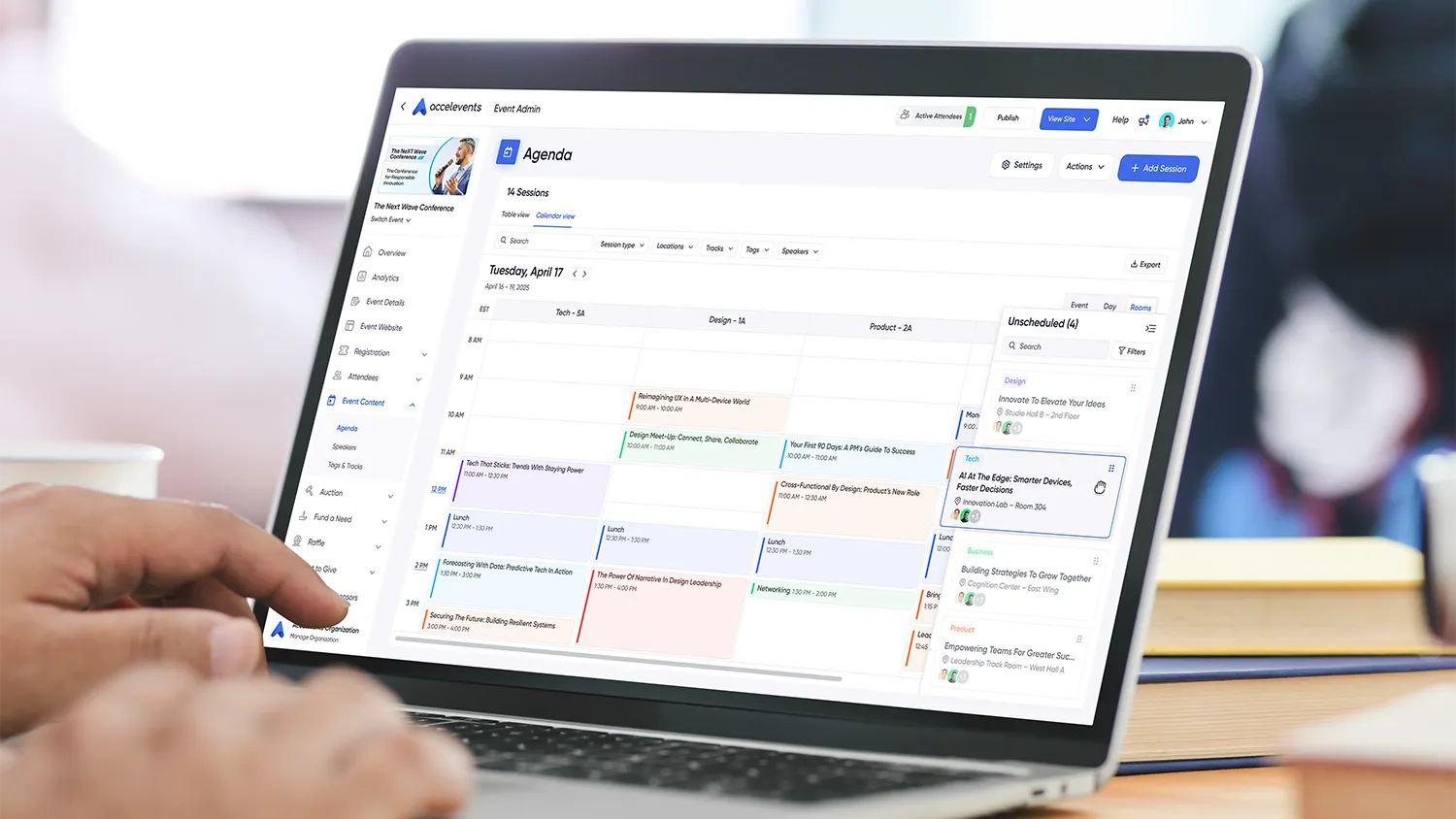While it may seem like a minor aspect of event management, the event registration process can actually have a big impact on the event experience. A smooth and easy registration process can increase event registrations, while a complicated one can result in frustration and abandoned ticket sales.
To ensure the event success, use the following strategies to audit and improve your registration process.
Assess Your Registration Process
To improve your event registration process, test it out for yourself first. Sign up and fill out your online registration form and see how long it takes and whether or not there are any obvious hiccups that may deter people from completing the process. Think of it as a dry run for your next event - the aim is to fix all the kinks before the big day.
Here are some questions to ask yourself:
- Is the registration form clear and concise?
- Am I asking for information that is already in my system?
- Are there unnecessary steps?
- Are the pages slow to load?

Check Your Conversion Metrics
Examine your traffic sources. How many people visit your event website? How many people click the registration link? And, finally, how many people register? If there is a massive gap between the number of people visiting your event page and the list of registrants, then something is causing people to abandon the registration process.
Identify Weaknesses In Your Event Registration Strategy
You may be able to identify what’s going on by test driving the registration process and looking at existing metrics, as mentioned above. Or you might have to take a deeper dive to boost event registrations.
Here are some potential causes for poor registration rates and low event attendance:
Ineffective event marketing strategy:
- Event promotions on social media were poorly timed or not implemented consistently across all social media channels (LinkedIn, Instagram, Facebook, etc.).
- Your email campaigns were not targeted to the right demographic or the messaging was off.
- Brand advocates, integration partners and other influencers did not share the event with their audiences.
- There was no-follow up to re-engage abandoned registrations.
Poorly designed event registration page:
- The registration process confuses event attendees because it is difficult to navigate.
- The benefits of attending the event are not compelling enough for your target audience.
- There are no incentives such as early bird discounts that compel your audience to register, or your call to action does not convey a sense of urgency.
Complicated registration form:
- The registration form is overly complex.
- The checkout timer does not allow for enough time to complete the registration.
- You require too much information from potential attendees.
Technical issues:
The registration page does not work properly or is slow to load.
Lack of payment options:
There is only a limited range of payment options. Online payment processing isn't offered.
High ticket price:
The event is too expensive to appeal to a wider audience.
Limited ticked availability:
The event is partially sold out or there are only limited ticket types available.
Below follow 10 tips to optimize your registration process. Combine them with an email marketing campaign to recover lost registrants and you'll be able to boost your registration numbers in no time.
Tip #1: Keep Everything Simple
No one enjoys filling out lengthy online forms. To keep your event registration quick and painless, only request essential information. Avoid asking prospective attendees for details like their driver’s license number, grandmother’s maiden name, or favorite color—focus on what you truly need to increase registrations.
Yes, registration data is incredibly important for event organizers but with each additional question, you run the risk of irritating people and causing them to abandon the process, and with that, abandon your event.
Typically, this information is more than enough for registration purposes:
- Full Name
- Phone Number
- Mailing Address
- Organization
- Job Title
There may be one or two other data points you wish to collect that are specific to your event but try to keep your questions to a minimum.
Tip #2: Ask for Preferences
While it's important to keep things simple, gathering a few key pieces of information about attendee preferences can help event professionals improve the overall event experience.
Ask questions about dietary restrictions, accommodations for impairments, and what specifically attracted them to your event to help shape your planning process and ensure a successful event.

Tip #3: Show Registrants Their Progress
A useful way to keep people engaged with your online registration is to show them their progress through the process. This can be in the form of a completion bar indicating the percentage completed, or by listing page numbers such as "Page 2 of 3." Seeing how much progress registrants have made can provide them with the motivation they need to continue, especially if you have a longer registration form.
Tip #4: Design User-Friendly Registration Forms
When it comes to improving online registration, going digital is only the start. You need to make sure the forms also have a streamlined design.
For starters, make sure your online event registration forms are available on your main event website. Visitors should not be directed to another site to complete the registration process. Any time a registrant is directed away from your website, it can cause confusion and mistrust. Think about it, how many times have you clicked a link that took you to a different page only to wonder if it wasn’t some sort of scam?
Your registration page and registration form should work on all internet browsers. In most instances, the problems that arise will be minimal (typically, spacing is the primary issue), but given that this is one of the initial touch points attendees have with your brand, you will want to make sure everything looks right and functions properly on any device.
Use legible fonts and bold the sections of the form that are most significant. Your registration system should be both clean and clear.
Don’t forget to include your branding on your registration page, but don’t overwhelm the space with unnecessary clutter. Registrants want to get in and get out fast.
Tip #5: Implement Mobile Event Registration
In this day and age, mobile-friendly registration features are a must. We’re certain that you know to optimize your website for mobile, but don’t forget to optimize your registration form as well. To do this, you may have to create a separate registration form for people who want to use a mobile device to register. This could mean changing the look slightly in order to maintain spacing and readability.
There are some event registration platforms like Accelevents that use responsive design, meaning all pages are automatically optimized for mobile use. Again, the easier you can make ticket purchasing and registration on your participants, the more likely they are to follow the process through to completion.

Tip #6: Enable Group Registration
For some events, it makes sense to enable group registration. Conferences and industry workshops, for example, are likely to see groups of people from the same workplace attend. If you enable one participant to register for the entire group, it can save loads of time and frustration for both event planners and participants.
Tip #7: Offer Multiple Payment Options
Multiple payment options provide the flexibility that attendees like to see. Allowing attendees to purchase their tickets using a credit card, PayPal, Apple Pay, or some other option, will make the process easier. Anything you can do to facilitate easier payment is likely to result in more sales and more satisfied attendees.
Remember, attendees are evaluating their experience from their first interaction with your brand. If they are not happy with the purchasing process, this dissatisfaction may carry over into the event and show up in their post-event survey responses.
Tip #8: Tie in Your Event Branding
Event branding can truly be the piece that will make or break your event. Creating a registration experience that aligns with your branding ensures a cohesive experience for guests from their first click on your event landing page through the entire registration process.
Incorporate your event logo into the registration pages, and ensure design themes align with your brand colors, fonts, and visuals for a cohesive look. It’s these small details that will really set your event apart and help to create a memorable experience for your guests.

Tip #9: Use All-In-One Event Management Software
A comprehensive event management platform helps you streamline the entire online registration process, from registration to event check-in and badge printing.
With Accelevents, for example, event organizers can set up a mobile-friendly website and app, process event ticket sales and registrations and streamline check-in. Plus we support onsite, hybrid, and virtual events so you can manage all your events in one place!
Tip #10: Don’t Neglect Event Check-In
You’ve already worked hard to to improve your online registration process, don’t let things fall apart at your next significant touch point: the in-person check-in. An easy registration process should lead to a smooth check-in.
With Accelevents, event staff can scan tickets to check in guests in a matter of seconds, and they can also process any last-minute registrations or ticket sales. Plus, we also have self-check-in options. That way, everyone stays happy!
Why Optimizing Your Registration Process Is Key
As an event organizer, showing your guests you value them is crucial. One of the simplest ways to do this is by respecting their time. By streamlining online registration, you can reduce frustration, boost completion rates, and create happy attendees who are eager to participate in your current and future events.
For more information on how to choose the right online event registration software, check out The Ultimate Guide to Online Event Registration and Ticketing. Or contact our friendly team for a demo. We’re happy to help with your upcoming events!








